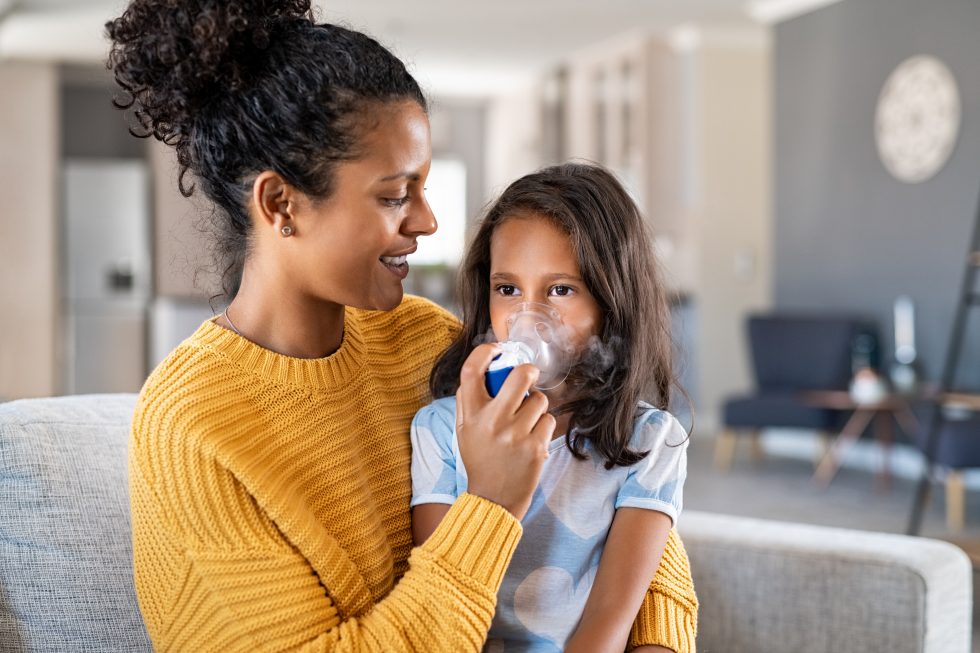
How Can I Help My Child Manage Their Asthma?
If your family is always on the go and is looking forward to spring so you can explore Charlotte and its shopping and dining trails, but you aren’t so sure if it’s a good idea because your child has suddenly begun to cough and wheeze your child may be dealing with asthma. Asthma affects people of all ages and is the most common chronic disease of childhood. Identifying and helping children effectively manage their asthma is crucial for their overall well-being and quality of life. Understanding asthma, how it affects the body, and what can trigger flare-ups can assist you in helping your child manage the condition through proactive steps.
Coughing and wheezing are common symptoms of asthma, but they may also occur due to respiratory infections like bronchitis or pneumonia. Shortness of breath and chest tightness may be mistaken for anxiety or physical exertion. It’s important to know that a child’s asthma can easily be mistaken for these common childhood ailments.
How Can I Recognize Asthma?
Asthma is a disease that occurs when a person’s airways become sensitive to a trigger, something in the environment, be it indoor or outdoor. When exposed to a trigger the linings of the airways swell and become inflamed, the surrounding muscles tighten, and the airways begin to produce mucus that is thicker than normal. These cause the airways to narrow, making it difficult for the lungs to take in or expel air.
Asthma triggers can be pollen, dust, chemical fumes, cockroach waste, mold, pet dander, changing weather, dust mites, exercise, smoke, or even respiratory illnesses such as the flu. Asthma is steadily increasing but the root cause is unknown.
Asthma Symptoms in Children
- Chest tightness
- Coughing, especially at night or early morning
- Breathing problems, such as shortness of breath, rapid breathing, or gasping for air
- Low energy
- Dark circles under the eyes
- Being irritable
- Wheezing, which causes a whistling sound on exhale
- Frequent chest colds
- Trouble eating or sucking (in infants)
Testing for allergies as well as spirometry testing, peak flow monitoring, and chest X-rays help confirm an asthma diagnosis in a child and help determine the severity of the condition.
Who is at risk of Asthma?
- Between 5 to 17 years old (symptoms may start sooner)
- Family members with asthma
- Food or nasal allergies, eczema
- Tobacco smoke
- Air pollution
- Underlying health conditions, i.e., being overweight
Most children have their first asthma symptom by age 5 and for some, it is brought on by exercise or even chilly air. If you suspect asthma, seek medical advice as uncontrolled asthma can lead to hospitalization. Asthma is responsible for over 900,000 emergency room visits and 94,000 hospitalizations a year in the U.S. Healthcare professionals recommend those with asthma get a yearly flu shot.
What Medications Help Asthma?
Managing asthma in children typically involves a combination of medications and environmental control measures. Quick-relief inhalers help relieve acute symptoms, while long-term control medications reduce airway inflammation and prevent flare-ups.
Medications for asthma symptoms:
Bronchodilators (beta agonists): Used for quick relief to help open narrowed airways, and relieve coughing, wheezing, shortness of breath, or difficulty breathing. The most used bronchodilator is albuterol.
Combination inhalers: These inhalers contain steroids and a long-acting bronchodilator (formoterol). Sometimes these medications may also be used for quick relief.
Steroids (oral or injectable forms): Sometimes needed for treatment of significant asthma flare-ups for a brief time.
Environmental control measures, such as identifying and avoiding triggers, improving indoor air quality, and developing an asthma action plan are also crucial. Asthma that is not controlled well can lead to severe asthma attacks that permanently damage airways, cause multiple days of school to be missed, and require emergency room visits or even hospitalization.
How Can I Help My Child?
- Find out your child’s triggers and keep him or her away from them.
- Give your child medicine as directed to prevent symptoms.
- Create and keep an Asthma Action Plan for home and school.
- Closely watching asthma signs and symptoms to know when they are getting worse.
- Know what to do when asthma gets worse.
- Make sure your child has proper emergency medication (typically albuterol) and paperwork on file with his or her school.
- Work with your child’s healthcare provider to find the best way to take care of your child’s asthma. There are guidelines for children from newborn to age 4, ages 5 to 11, and ages 12 and older.
Asthmatic children with well-managed care can benefit from regular physical activity just like other children. Exercise helps maintain a healthy weight and can also improve lung capacity minimizing the overall impact of asthma. Physical exercise can trigger exercise-induced asthma, especially when the air is dry. Understanding these factors can play a role in determining which sports are best suited for your child from a lung health perspective. If your child is allergic to air pollution, then a sport that takes place indoors might be the best option for them. Or, if frigid air is a trigger, then a summer sport might be a better option over an outdoor winter one.
Visit AFC Urgent Care Tyvola Road for appropriate management strategies, so that your children with asthma can lead active and fulfilling lives while experiencing minimal impact on their daily activities.